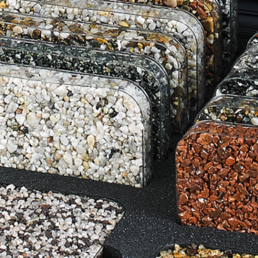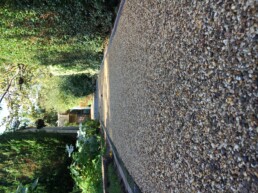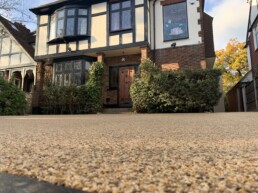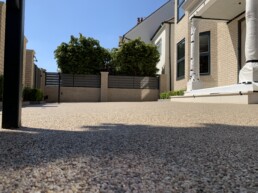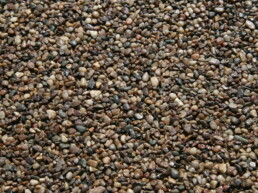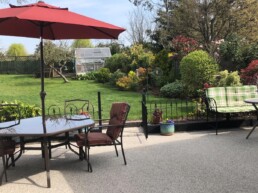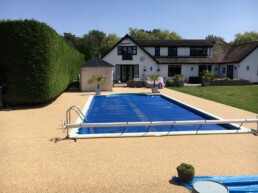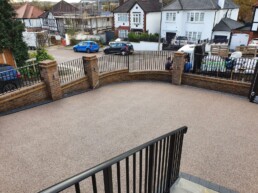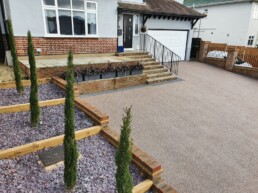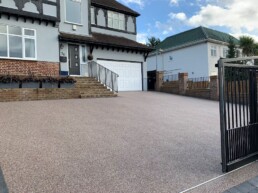Leading Experts in Resin Bound Application
Based in Essex we have helped many in the South East transform their homes with this stunning material. IBBco are different as we offer the complete package. We build from the bottom to the top completing the full process ourselves due to our expertise in different materials. We frequently use resin for driveways, patios, footpaths, entrances and even swimming pool surrounds. Our professional team work with you throughout to ensure that you receive your desired result.
What is a resin bound system?
A resin bound system is a surfacing solution created by mixing both resin and aggregates together in a forced action mixer which is then trowelled on to a surface resulting in a smooth, flat finish. Its popularity is increasing because it is attractive and durable. The resin bound system can also be overlaid to new or existing concrete or tarmac.
It is permeable due to the way it is mixed, allowing small gaps between aggregates. In short it is therefore a SUDS compliant solution.
If you would like us to visit please contact our friendly team today for a free quotation.
Both systems use resin and aggregates to form fixed surfaces. Despite having similar names, they are completely different. This page will explain the key variations between the two.
Resin bonded is a system where the resin is spread across the base and the aggregate is scattered into it. Most of the aggregate will adhere to the resin however some will remain loose. As a result:
- It is not porous as water cannot pass through the complete layer of resin
- It is not a SUDS compliant solution
Resin bound is the fastest growing solution in the UK and it is being embraced by landscapers, developers and contractors nationwide.
Unlike resin bonded it is a porous surface as it allows water to pass through to the ground beneath. When laid onto a permeable base it is a SUDS compliant solution.
Benefits Include
- A smooth, flat finish with no loose gravel
- Strong and durable, remaining so for many years
- Low maintenance, easy cleaning and high resistance to weeds
- Will not fade or discolour as it’s UV resistant
- Limitless design possibilities due to different sizes of aggregate
- Wide range of aggregate colours which can even be mixed together
- Lastly it is precise and flexible with both the design and shape
At IBBco we believe a resin bound system is the highest quality aggregate-based surface solution currently available. Other systems don’t offer the same range of strengths, resistances, structural and aesthetic benefits.
Sustainable Urban Drainage System
Most natural ground surfaces such as grass and soil are permeable. Built up areas are very different featuring predominantly tarmac, asphalt and other kinds of paving. When surface water is unable to infiltrate the ground it can cause many issues including flooding and water pollution.
Why is SUDS important?
In order to tackle this new driveways and other surfaces need to comply with SUDS building regulations. The Environmental Agency strongly encourages the application of resin bound to help. Even if you do not live in an urban or built up area a resin bound driveway is highly encouraged to prevent flooding.
Is a resin bound system SUDS compliant?
Yes, your resin bound surface will be SUDS compliant providing it is laid onto a porous base. This can be a special concrete or open textured tarmac on top of a type 3 stone. On the other hand laying a resin bound system onto an impermeable base will not be SUDS compliant.
Resin bound aggregates include small gaps between each one where water is able to infiltrate the ground beneath. That being the case a resin bound surface can handle 850 litres of water per square metre, per minute. The system can also be laid directly on top of old tarmac or concrete. The existing surface will require a suitable soakaway or drainage flow and must also be free of any cracks.
Is a resin bonded system SUDS compliant?
No, resin bonded systems are not SUDS compliant because resin is applied directly onto a surface, usually tarmac or concrete. This forms a layer of hardened resin which water cannot pass through.
What does the UK Government say?
You will not need planning permission if your new or replacement driveway uses permeable surfacing (no matter the size.) Gravel, permeable concrete, block paving or porous asphalt allow water to drain through therefore it is not required. Equally, if the rainwater is directed to a lawn or border to drain naturally.

